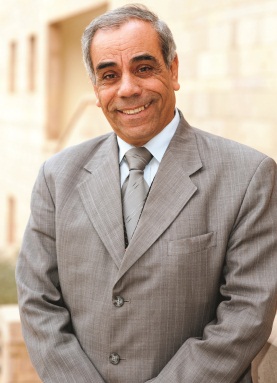Community Catalyst
| |

|
| |
Photo by Ahmad El-Nemr |
Salah Arafa named Man of the Year for
Environment and Development
By Doaa Farag
Salah Arafa, physics professor at AUC, has been selected Man of the Year for Environment and Development by the Society of Writers on Environment and Development. Arafa researches how to utilize natural resources to create eco-friendly communities in rural villages, which will develop capacity and competency for residents of rural areas. One of Arafa’s projects, Basaisa, has gained wide recognition as a model for successful sustainable development projects in Egypt.
Established in 1996 by renowned Egyptian journalist Salama Ahmed Salama, the Society of Writers on Environment and Development honors experts who had an impact on environmental development. The society’s goal is to develop the capabilities of journalists working in the environmental field and to raise awareness on environmental issues. “Professor Salah Arafa is the leading pioneer in environmental development in Egypt,” said Susan Zaki, the society’s secretary-general.
“The society honors him for his distinguished role in achieving sustainable development in rural Egypt. He was the first to use solar energy and recycling in rural areas, and was the first to develop the capacity of young people living in rural areas and to empower rural women through offering appropriate training and job opportunities that are compatible with their way of life.”
In 1974, Arafa decided to go beyond the boundaries of a university and work in a small village in the Sharkia governorate. At the time, he was working alone without funds or supporters. Every Friday, he would travel to this remote village, Basaisa, to work with residents on improving living conditions. By utilizing local resources and engaging all of the residents of the village, Arafa created an “integrated approach to development.” His program included training sessions in agriculture, efficient use of natural resources, literacy, group collaboration, creative thinking and community building. Today, as a result of Arafa’s efforts, Basaisa has been transformed from a poor and marginalized village to an eco-friendly community for sustainable development.
Through open dialogue and dedication, Arafa was able to encourage the residents of Basaisa to work with him to reduce illiteracy rates, educate women, as well as guide youth and farmers. After a couple of years of working independently, AUC students, friends and colleagues joined Arafa in this mission. “When people started to learn about what I was doing in Basaisa, they became enthusiastic and wanted to participate so that they could direct their efforts toward sustainable development,” Arafa explained. “In the end, everyone found something to contribute and a way to share in the responsibility of this project.”
Arafa also started a project in 1992 in New Basaisa, a small desert community in Ras Sudr, South Sinai governorate. “When we went to the new village, we introduced new technologies, such as recycling of agricultural waste to produce biogas, and solar energy for producing electricity and heat,” Arafa said. “With 28 young men, we were able to create a new eco-desert community that is ecologically and environmentally friendly. It was difficult, but possible.”
|